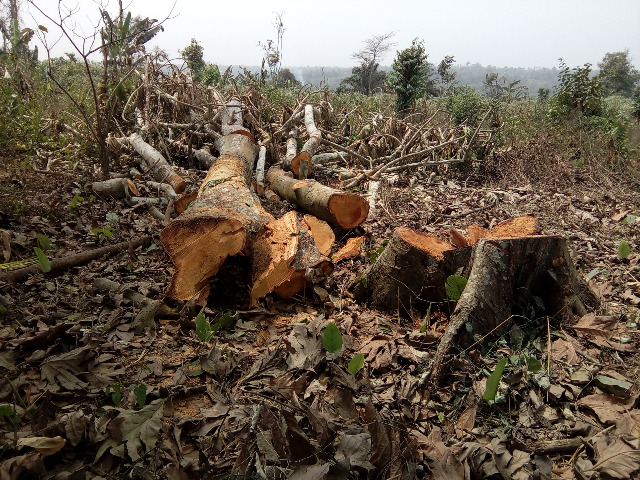Religious Ecology and Tree Discourse in Nigerian Pentecostalism
| Date: | 28 March 2024 |
| Author: | Francis Adebayo |

Tree discourse captures how humans name, characterise and relate to trees. In Africa, tree discourse is laden with religious and sacred meanings coterminous with a worldview that spirits inhabit spaces such as trees, stones, and water to mention a few. These religious, sacred and spiritual meanings shape tree hold and the concept of sacred forests or grooves. This belief system births a religious ecology where material objects embody spirits and spirits inhabit non-living materials. This form of materiality is what I refer to as a religious ecology of spirits. It will also show how this ecology has produced a conflict of spiritualities between the indigenous African religions and Pentecostalism. Drawn from fieldwork data primarily designed for a doctoral project, this post contributes to the debate on the climate crisis from an African religious perspective.
Beginning in the 1970s, Pentecostals in Nigeria began to establish religious sites along the Lagos Ibadan Highway as prayer camps. This culture of prayer camps has been interpreted as an index of Pentecostal growth and spiritual rejuvenation. However, the preference for the 127-kilometre highway that links Ibadan, the capital of Old Western Nigeria, and the current Oyo state with Lagos, Nigeria’s commercial capital and former national capital, is of ecological significance.
First, before the arrival of these camps, the land bordering this Expressway was a pristine vegetation that was symbolic of Nigeria’s green colour. There were also intertwining streams and swamps that provided the dews of the morning and humid evenings. Ancient trees planted by nature dotted the landscape and covered the skylines. Farmlands, wet forests, and virgin soils merged as habitats for wild games often seen running across the Highway, and for singing birds and screaming insects whose music could be heard should one’s journey be interrupted along this road.
With the arrival of camps such as the Prayer City of the Mountain of Fire and Miracle Ministries, Faith Village of Gospel Faith Mission, the Youth Camp of Assemblies of God, the Redemption City of God owned by Redeemed Christian Church of God, Deeper Life Camp ground of the Deeper Life Bible Church, the Prayer camp of Islamic charismatic group known as Nasrul‐Lahi‐il Fathi Society of Nigeria (NASFAT), the Nigerian Baptist international convention centre, and Christ Embassy campsite (to mention a few), this vegetation has disappeared and the climate of the area altered with ripple effect on Nigeria and the world.
One driving force behind this culture of prayer camps is the theological rhetoric of the Pentecostal mission. According to this rhetoric, any evidence of visible growth equates mission including occupying territories, opening new branches, and attracting crowds to meetings. A corresponding narrative is the Pentecostal soteriology that undergirds a form of evangelism that wants all uninhabited forests and spaces cultivated through deforestation and appropriation. In their view, by occupying the habitat of the spirit beings of indigenous religion, the space is cleansed of evil spirits and their worshippers.
This pentecostal view is an affront to the indigenous African discourse on tree holding and sacred space. The praxis that equates mission with occupying territories, opening new branches, and attracting crowds to meetings is informed by a pentecostal soteriology that wants all uninhabited forests and spaces cultivated through deforestation and appropriation. In their view, Pentecostals claim that evangelism includes the cleansing of lands, water bodies, trees and stones of the spirit beings of indigenous religion.
Suffice it to say that this Nigerian Pentecostals religious ecology opposes the indigenous idea of ecological sustainability conceptualized as sacred spaces. Traditional Africans have constructed a holistic spiritual cosmology by uniting the physical and the spiritual realms together. This worldview underpins their approach to life and their interaction with spiritual and non-spiritual beings that cohabit in this universe with them. Based on this religious cosmology of spirits, Africans nurture and abhor forests and sacred spaces.
Africans believe that trees habour spirits, whose presence confers beingness on those trees. By understanding the African religious cosmology, one engages with the epistemic source that informs the African moral order and social etiquettes based on communal telos. This moral order in many African societies fosters human discourse about trees by focusing on human attitudes to forests and the recognition of forests as beings in the world. This belief shapes humans’ relationship with trees and sacred forest as part of the cosmos with them.
The ecological consequence of this Pentecostal camp culture can be weighed in terms of the loss of non-human species, reduced removal of CO 2 , increase in drought fire, heat and flooding. This point confirms how religious practices have proximate and remote consequences on the social and ecological environments than these churches are unwilling to accept.
About the author
Dr K. Francis Adebayo is interested in the theology of social concerns and how this intersects with migration, ecology, and politics. His academic projects embrace missions, migration, ecology politics and public policy within the broader field of practical theology and religious studies.

